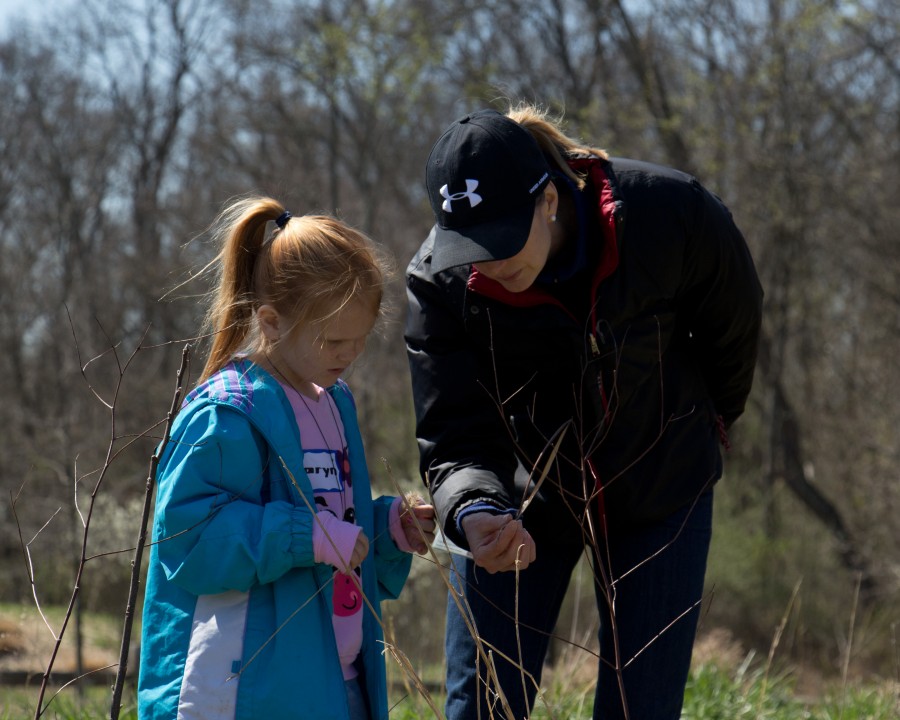Blog
The Power of Parents

By Melissa Sabo, School Programs Manager
On a cold morning in early March several years ago, the Rowe Visitor Center was filled with excited second graders here for a field trip. As their introduction to the day began, the naturalist greeting their group held up a shiny yellow sun and said with hope, “We’re looking for an adult to be our sunshine today!” While all 65 children turn around to look at the chaperones sitting behind them, one of the parents jumped up from his chair and ran to the front of the room. He squeezed into his costume to the soundtrack of giggles, both adult and child, and put his hands up in a “sunshiney” gesture. His son didn’t voice embarrassed groans or succumb to teasing. Instead, several children leaned over to Mr. Sunshine’s son and whisper, “Your dad is SO COOL!” and “Aww man you’re so lucky.” As the dad participated in a photosynthesis role, he gained instant rock star status with the kids.
In that short and funny moment, a parent chaperone attending a field trip with his son became a role model for a room filled with children. One of the Nature Center staff certainly could have donned the sun costume instead, but I doubt it would have had the same effect. This memory continues to pop into my head from time to time because it was such a great illustration of how much an enthusiastic parent can add to a program.
For many students, their Nature Center field trip is a one-time experience that fits into a life or earth science unit back at school. Students often delight in the hours spent in the forest with us finding real-life examples of what they’ve been studying at school. However, the lessons they learn here will fade quickly unless their experiences are pulled back into their post-field trip lives. This is exactly why Nature Center school programs focus heavily on engaging parents and teachers in outdoor activities with children. After all, who better to continue outdoor exposure and discussion after a field trip than the adults who see the children on a daily basis?
The Nature Center’s focus on chaperones, a group largely composed of parents, began in 2013 when we learned that 26 chaperones were on their way for a field trip with 40 second graders. With a ratio of one to two children per adult, we realized the need to better utilize chaperones as a resource and to try new methods of putting parents in a leadership role. Thus began a series of trials and trainings for Nature Center staff and volunteers targeting parent engagement, as well as orienting parents at the beginning of each day. Parents began to receive daily direction on how to avoid making “ick faces,” how to ask questions and lead discussions with students and what role we hoped they would take on during the trip. In return, we gave them meaningful ways throughout the day to help, rather than just asking them to walk behind the group and make sure everyone stuck together.
While this change took time and a lot of effort, we eventually started noticing a difference in the engagement level of our chaperones. With each success story, more confident Nature Center staff or volunteers followed. We found that when we spent a few minutes outlining our expectations for chaperones at the beginning of the day, any confusion between teacher, naturalist and parent was untangled and everyone started off on the same page. And when we then asked chaperones to take on more responsibility, they stepped up to the challenge eagerly!
In 2016 and 2017, the Nature Center did research on some of our field trip chaperones to see what SCIENCE had to say about the effects of chaperone training and the change in how our group leaders invited participation from chaperones. It turned out that chaperones who received an orientation as they arrived had much better behavior than those who didn’t receive an orientation. That means they didn’t spend time on their phones live-tweeting the field trip, talking amongst themselves, or making negative comments about “gross spiders”. Instead, they made positive comments about activities, participated fully in group activities, and became more of a teaching partner to the Nature Center group leader. In addition, we found when Nature Center group leaders regularly invited chaperones to participate in or lead group activities, they showed huge improvements in how positively they were engaging with students. The combination of orienting chaperones and inviting them to take on a meaningful role in the field trip made big differences in how involved chaperones became.
The results of our research added some data to what Nature Center group leaders have been anecdotally sharing for the past several years: Parents have the power and ability to create big changes in a field trip day and add a new depth to our programs.
Nature Center group leaders have shared many stories of inspiring parents and incredible moments on the trail over the past few years. One of my fondest memories was hearing about the mother who initially claimed to be a “city person” and very uncomfortable with nature. The children and naturalist in her group continually encouraged her throughout the day, celebrating her successes as much as those of the students. By the end of the day, she was observed laughing and sharing her discoveries with the kids while her hands were wrist deep in mud. Imagine how powerful her transition from hesitance to head-first would be for a child who was uncertain about the outdoors.
Sometimes watching “the pros” may not be enough for children who aren’t sure they can take on a new challenge. What they may need is to see someone they trust, like a teacher or parent, take that challenge alongside them.